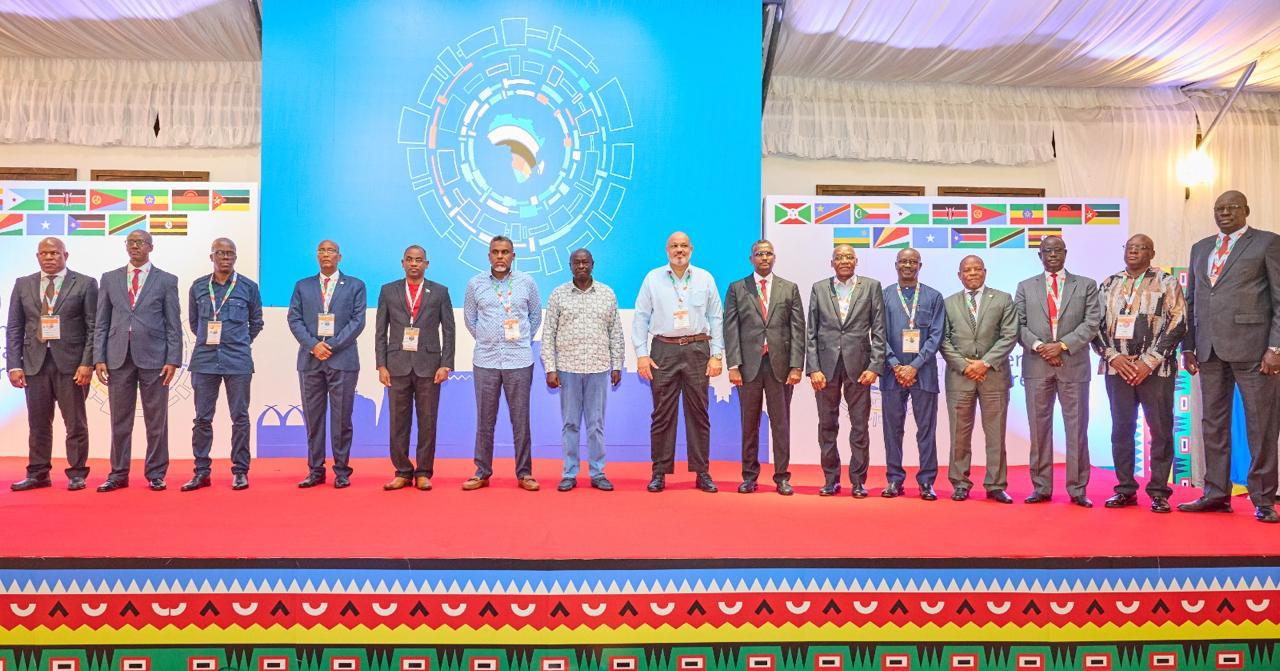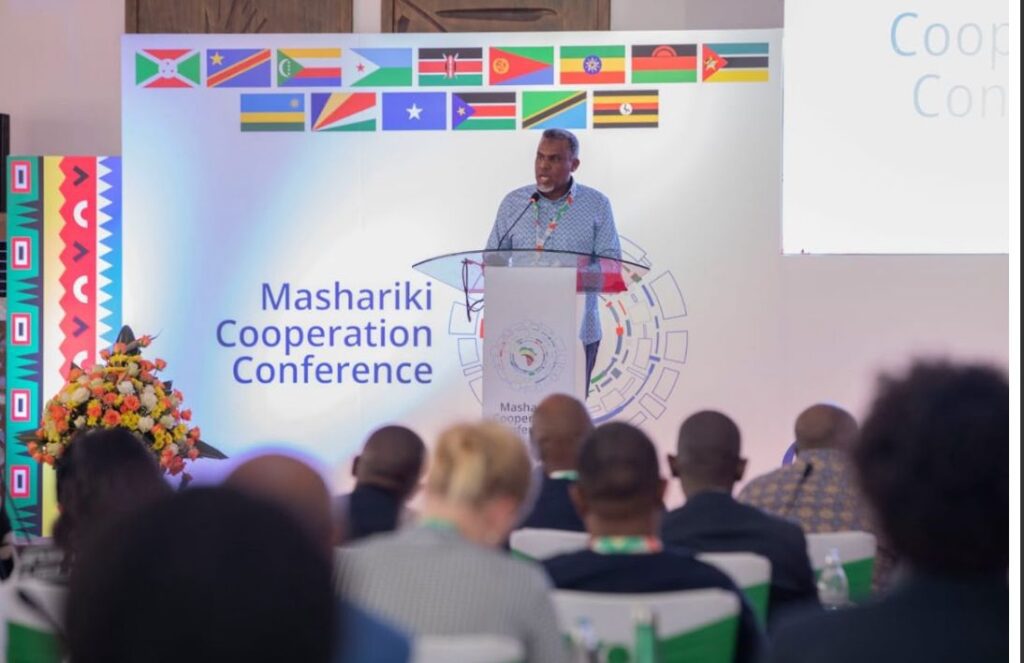The Director General of the National Intelligence Service Noordin Haji wants regional countries to be ready for any pandemic.
This he said will be made possible when the countries’ strategy encompasses pandemic preparedness through investment in robust surveillance systems, the development of vaccines and therapeutics, and regional knowledge sharing.
He said embracing climate-smart solutions is also essential, involving the transition to renewable energy sources, the implementation of sustainable land management practices, and the construction of infrastructure resilient to extreme weather events.
Further, building cyber resilience through enhanced cyber security protocols, training skilled professionals, and fostering international cooperation must also be part of the comprehensive security approach.
“We must identify effective ways of ensuring that our intelligence must inform not only security strategies but development plans.”
“We must identify and nurture the seeds of innovation, as well as, foster the conditions that will promote entrepreneurship and lead to the development of more inclusive, resilient economies,” he said.
He made the remarks when he opened the heads of Intelligence and Security Services from the Eastern Africa region meeting in Mombasa on Sunday.
The officials are meeting to deliberate ways of strengthening cooperation and collaboration, address the shared challenges, and capitalize on the prospects for a peaceful and prosperous region.
Those in attendance are from Kenya, Tanzania, Uganda, Somalia, Ethiopia, Burundi, Rwanda, Eritrea, Mozambique, Comoros, the Democratic Republic of Congo, Djibouti, Malawi, South Sudan, and Seychelles.
The conference runs from January 27 to 31 and is dubbed the “Mashariki Cooperation Conference.”
Haji said they aim to create a secure, stable, and progressive region, where security measures support and are supported by sustainable development and inclusive economic growth.
He said countries must transcend individual interests and forge a path of unity upon which the security and prosperity of the nations rest.
“As intelligence leaders, we understand that information knows no borders, and neither should our efforts to protect our citizens.
United, we have the power to harness our combined strengths, resources, and expertise to tackle challenges with greater efficiency,” he said.
“Through the Mashariki Cooperation Conference, we have the opportunity to make strides in our region’s defense and intelligence system.
Let us seize this opportunity and heed the call to strengthen our region’s security through the opportunities presented by deepened cooperation and collaboration.”
Deputy President Rigathi Gachagua opened the conference and urged the participants to share assessments of the threats and opportunities that exist in the region and find ways to strengthen cooperation and collaboration to address shared challenges.


“While your mandate is mainly working at the national level, the changing landscape of security demands that we seek and enhance partnership networks beyond our borders.”
“Indeed, Security is a National, Transnational, and International issue that must be tackled with corresponding interventions,” he said.
He said the meeting takes place when some of the countries in Eastern Africa face security challenges in armed internal conflicts and terrorism.
“This is besides transnational organized crimes including trafficking in humans, especially children, drugs, counterfeit goods, corruption and money laundering, and wildlife trophies, among others.
Armed conflicts are, among other issues, fueled by illegal trade in weapons across the borders.”
Gachagua said terrorism and religious extremism are taking root as radicalization cells also grow and that as technology advances, crimes and other forms of insecurity have gone hi-tech and, therefore, more complicated.
“These and other security challenges threaten national development agendas for socio-economic transformation towards the Africa We Want, as outlined by Agenda 2063 of the African Union,” he said.
He said security concerns are a threat to Africa Rising, besides the achievement of Sustainable Development Goals, as envisaged under Agenda 2030.
He said insecurity if not strategically and decisively tackled, may derail the vision of transforming the lives of the people.
“As a region, we have all borne the brunt of insecurity when our neighbors are troubled.”
“Trouble anywhere in our region is trouble for everyone. That is why we must work together to address security threats,” he said.
He told the participants they have an opportunity to review gaps and trends in security matters from traditional spaces into Digital platforms, which have made crimes more complex.
Digital spaces, he added have become playgrounds for recruitment and Radicalisation, money laundering, and trap points for homicides and other cybercrimes, sadly, as recently witnessed in Kenya.
This calls for strengthening the capacity of officers in digital skills.
This is in addition to recruiting experts in specialized and emerging areas in technology, to be ahead of the game.
While more resources are required in the integration of Artificial Intelligence into security operations, we have no option but to invest for better outcomes.
The conference comes at a time when the region is facing a myriad of challenges that continue to threaten the region’s security, peace, and stability.
These challenges include terrorism and religious extremism, transnational organized crime; political social, and economic threats as well as emerging threats associated with pandemics, climate change, and cyber security among others.
According to the organizers, these threats continue to hamper the region’s economic and social growth, calling upon intelligence organizations and security agencies to play a leading role in addressing them.
“Despite the challenges, the region has made significant strides to counter prevailing threats.”
“For instance, through the development of effective cooperation and information-sharing platforms, several planned terrorist attacks on our region’s soil have been foiled and mitigated,” said an official aware of the meeting.
Some of the processes to institutionalize these initiatives include the establishment of the East African Community’s Peace and Security Sector in 2006 and thereafter, the Djibouti Process on Security and Counterterrorism which laid the groundwork for coordinated action in our region.
As partners, the regions created the IGAD Cyber Security Centre and the Eastern Africa Police Chiefs Cooperation Organization (EAPCCO) to strengthen regional resilience against cyber threats and foster collaboration on cross-border crime, as well as other organized criminal activities.
In more recent years, Regional Fusion Centres (RFCs) have served as critical nerve centers for real-time threat analysis, information sharing, and joint operational planning.
These frameworks have provided a solid foundation for cooperation and collaboration but demand more than the existing frameworks to ascend to new heights of collaboration and adapt to the changing security dynamics, which makes forums like this conference immensely important.
Apart from enhancing understanding of the security challenges facing the region and identifying current and potential opportunities, the discussions from the conference are expected to culminate into a yearly Mashariki Cooperation Conference to strengthen the cooperation and collaboration frameworks to be put in place.
This is informed by a shared history, interconnected communities, and common cultures that stride the Eastern African region.

